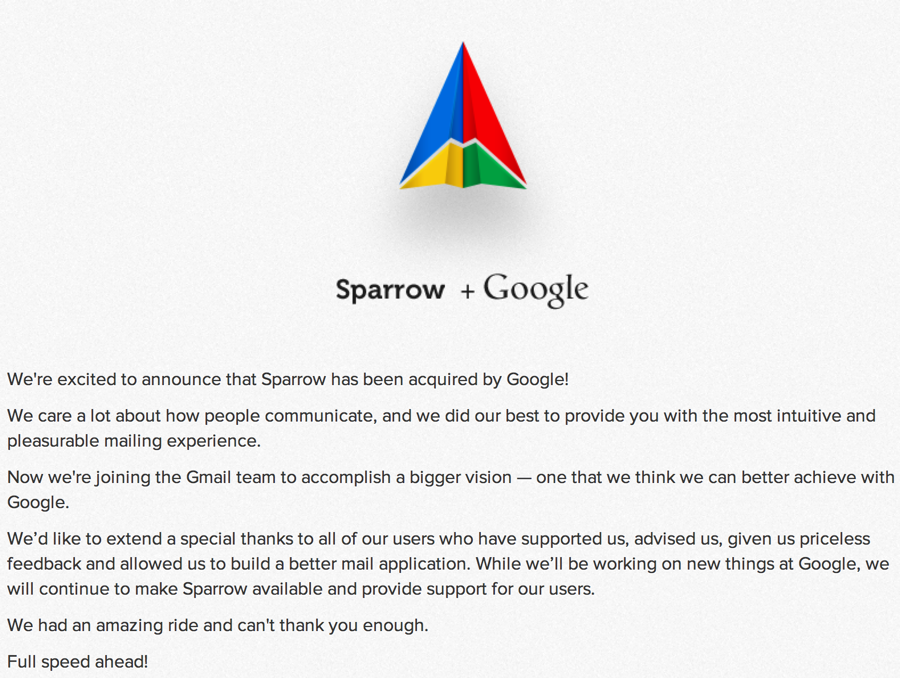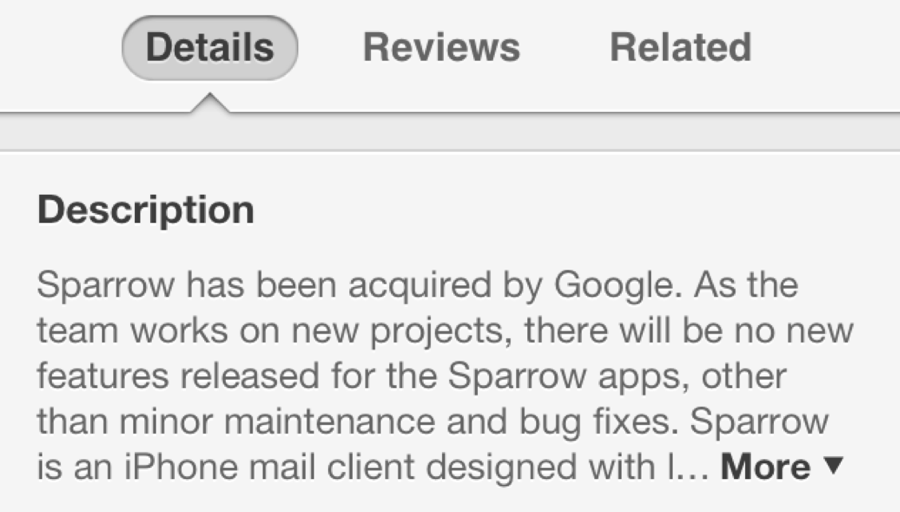
Google bought Sparrow, the Mac and iOS mail app that had gained a loyal and growing following. I used Sparrow at first launch and was finding myself turning to it with increasing frequency on my Mac. I even went back to using it on my iPhone the other day.
Now Google has purchased the company. Go to download the app and you will see all the enhancements planned for it in the future.
Oh. Wait.

Yes, that’s right, Google is killing off Sparrow. Here’s why I’m a bit peeved. I used Sparrow for Mac in Beta. I purchased the iOS app. I purchased the Mac app. And now, in one quick move, the apps are dead. Sure they will continue to work, for now, but the promised push notification for iOS will never come. Nor will any other enhancements. It truly proves buyer beware. When companies like Sparrow/Google pull this, or Microsoft/Nokia with Windows Phone 8.0 (see our upcoming Gear Chat on the subject) it shows a total disregard for customers. And yes, it does make me less likely to use their products in the future.
So here is a great way to prepare for the upcoming changes AND show how excited you are for the Sparrow team.
UPDATE: Rene Ritchie has an excellent and principled piece over on his site iMore. (Read it!) As is usually the case, Renee argues his position with a depth and clarity rarely found in the blogosphere these days. At one point he writes,
The crux of this argument is that Sparrow doesn’t owe users anything. Users paid, got the version of the app they paid for, the transaction was one-time and completed. And that users have no right to complain now.
The first few points are completely accurate. The last one, that users have no right to complain, is flabbergasting. (Yes, as someone who worked in software marketing for years, my gasts are literally flabbered.)
Certainly there’s a segment of the user base that is outrageously entitled. There are those who believe that they shouldn’t have to pay for software, even though they themselves get paid for their work, or who run beta operating systems or jailbreak and then leave negative reviews for apps they themselves broke, or that once they buy one version of an app, they’re forever owed all future versions, for free. All of which is nonsense.
However, there’s also a segment of the developer community that’s just as outrageously entitled. That believe their success is detached from their user base. That they can act anyway they like, and that any negative reaction by their user base should be dismissed at best, attacked at worst. All of which is also nonsense.
Both beliefs do a disservice to the developer-user relationship, a relationship that can be powerfully beneficial for all parties involved.
It is a great post and well worth the read. There’s just one problem with his ultimate conclusion, Sparrow is not the best example for his argument. Not by a long shot. It isn’t that the developers OWE anything to those who purchased the software, they don’t. They are in business and their goal is to make money. (Reportedly somewhat less than $25M in this case.) Good for them. They offered a product and people purchased the product. Transaction done.
There is, however, one big problem with the immediate announcement that, upon acquisition by Google they would cease any further enhancements to the app… THEIR OWN WORDS. On their blog they wrote the following
What’s up on Push?
Thanks to your amazing support, we feel confident that Apple might revise its position on the Push API. We’ll submit a first version of Sparrow 1.2 including it. This might delay Sparrow 1.2 validation but we’re already working with some partners to include Push in future versions of Sparrow without needing Apple clearance.
Push is coming. With or without Apple.
They were clear. They were unambiguous. They promised push email in iOS. No doubt some people purchased the app based on that promise and now that promise is dead along with all future advancements. At a MINIMUM they owe anyone who purchased the app after that blog post a refund.
It is that simple. And a reminder to developers to be careful what they promise… and to consumers to NEVER make a purchase based on anything other than the current product.

It might smart a bit since it’s only been a year (or less), but I think this is fundamentally different from the WP8 upgrade thing. The Lumias don’t have NFC, they don’t have multiple cores, they aren’t capable of running DirectX–the list goes on as to fundamental issues with incompatibility or plain old missing components. Sure, they could just call 7.8 8, but that would be disingenuous. That would be like 3GS’s “iOS 6” writ large. It wouldn’t hurt if Microsoft offered some kind of trade-in program though.
Sparrow, on the other hand… this is purely a case of Google not willing to let them spend the additional time and money to finish what they’re doing. I can’t imagine them having made zero progress on the notifications issue, and it seem petty to just kill it off.
Let’s step back for a minute. Because if we do I suspect we will see the WP8 play as far WORSE. The Lumia 900 came out how long ago? And with a commercial talking about all other phones being “Beta Tests”? How long did MS already have the sun setting of all previous hardware in the works? They released new phones knowing they would be obsolete by the end of 2012. If they do not have a trade in program it is truly an ugly ugly play.
Apple, on the other hand is pretty amazing in the update realm. I was running iOS 6.0 on a 3GS and most of the features the Beta brought to my test iPad were also there. In other words There is, in my opinion, close to zero parallel between MS and Apple in this case.
The Sparrow move is a bit ugly on Google’s part. Can’t blame the devs TOO much but since they promised push they SHOULD either deliver or refund.
Sent from my iPad
First off, I didn’t say that iOS6 and WP8 were equivalent. That’s why I said “writ large”; perhaps I should have said “writ humongous” to get my point across. Second, if Microsoft had called WP7.8 WP8 instead, would anybody who didn’t dig into the code know? As long as all the necessary APIs were still in place, would anybody be able to tell? Because what it seems like in this current situation is that Microsoft couldn’t possibly win.
There was no way for the W8 core to be ready any earlier than it was, and even if it was, the hardware available wouldn’t have been sufficient. If Microsoft kept selling Windows Mobile devices, people would write them off as being out of touch. If Microsoft simply killed WM without offering a replacement of any sort whatsoever, people would write them off as being hopeless.
What would you have done?
Sent from my browser
First off, MS killed of Windows Mobile devices when they introduced Windows Phone. And that’s a big part of this. All of the devices we are discussing are part of Windows Phone – that is – part of Microsoft’s mobile operating system that they JUST recently introduced. In other words, it was not all that long ago that they Sunset an entire line of devices in favor of the new operating system. Now, just when the device was beginning to make sure they are doing exactly the same thing.
What would I have done? One of two things. First, I would have found a way that the devices I sold 3 to 6 months previous would get the upgrade even if it did not include one or two of the features. If that was not possible I would have I found some way to give consideration to those who bought the NEW hardware with the NEW software (that was now being sunset AGAIN) within the past year some consideration.
We’re talking a slew of devices that are now completely obsolete and this is NOT ancient history—from Wikipedia- Microsoft officially unveiled the new operating system, Windows Phone 7 Series, at the Mobile World Congress in Barcelona on February 15, 2010, and revealed additional details at MIX 2010 on March 15, 2010. The final SDK was made available on September 16, 2010.[14] HP later decided not to build devices for Windows Phone, citing that it wanted to focus on devices for its newly purchased webOS. As its original name was criticized for being too complex and “wordy”, the name of the operating system was officially shortened to just Windows Phone 7 on April 2, 2010.
I’m not really sure who the recap was for. Back when WM 6.5–which itself was a kludge–came out in late 2009, many reviewers were already calling it behind the times. Without WP7, they’d be out of the game for three years!
“First, I would have found a way that the devices I sold 3 to 6 months previous would get the upgrade even if it did not include one or two of the features. If that was not possible…”
I don’t understand why you’re still maintaining the “if”. It just plain isn’t; the cores of the two are completely different. WP7 still has its roots in the CE days, while WP8 is essentially NT. About the only thing you and I agree on is that MS should upgrade the users.
The thing that comes to mind is the PowerPC-x86 transition for OS X. Even though it was called 10.4/5 for both versions of the OS and looked and functioned on the outermost levels the same, they were different OSes and applications didn’t always function 100% the same in both. It sounds to me like Microsoft should have just gone this route, writing off incompatible apps as old phones not being powerful enough to run them, just to avoid all the drama.
The recap was to make the point that this is not ancient history. This is related to a “transition” that occurred within the last two years since that is the timeframe within which MS launched a new OS and the hardware to support it. I recapped because the timeline IS important- particularly given your reference to “Windows Mobile Devices” which neglects the fact that since 2010 they have offered and entirely new OS (called Windows Phone) with new hardware to support it. That makes this the SECOND sunsetting in just a few years.
The “IF” wasn’t something I was “maintaining”… you asked what I would have done and I gave a straight answer… IF possible I would have found a more seamless way to maintain those who purchased my product in the preceding year. Were that not technically possible, I would have done something more than offered a new home screen.